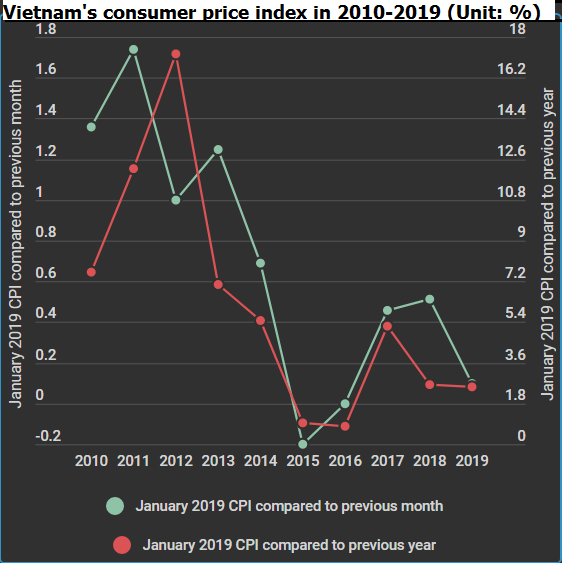CPI rises 0.1 percent thanks to abundant supply of goods in new year
 Illustrative image (Photo: VietnamPlus)
Illustrative image (Photo: VietnamPlus)
Hanoi (VNA) - The consumer price index (CPI) of January rose only 0.1 percent compared to the previous month and 2.56 percent year-on-year thanks to abundant supply of goods for Lunar New Year celebration.
A report in January of the General Statistics Office (GSO) showed the CPI rose only 0.1 percent compared to the previous month and 2.56 percent year-on-year.
Vice head of the GSO’s Statistics Department Do Thi Ngoc said as January is the month prior to the Lunar New Year, consumer demand surged against previous months. However, the slight increase of CPI was attributed to plentiful supply of goods ahead of the Lunar New Year (Tet) holiday.
The report indicated that compared to December 2018, nine of the 11 groups of main consumer goods and services recorded price hikes. The highest and slowest expansions were beverages and cigarettes (0.69 percent) and medicine and healthcare services (0.01 percent).
Meanwhile, prices in transport and postal and telecom services dropped by 3.04 percent and 0.09 percent, respectively.
Prices of food, catering services surge
In the month, prices of food, beverages and garments surged due to preparations for the Lunar New Year (Tet) celebration.
Accordingly, prices of restaurants and catering services increased 0.66 percent. Prices of pork inched up by 0.42 percent due to increasing production for Tet. Meanwhile, prices of fresh poultry expanded 1.01 percent, with those of domestically-produced chickens increasing by 5,000 VND – 10,000 VND (0.2 USD – 0.4 USD) per kg.
Ngoc said at this time, retailers tend to delay the sale of their products until Tet draws near for higher prices.
Besides, prices of aquatic products also went up, including fish (0.91 percent), shrimp (1.67 percent) and processed seafood (1.06 percent). Northern localities were hit by prolonged cold spells at the end of the year, thus vegetable supply fell in the period, resulting in a price surge of 2.51 percent.
Prices of food also rose 0.52 percent. Ngoc explained that firms in the Mekong Delta purchased high quality rice, as demand for imported rice in the Philippines and Indonesia is projected to surge in the first quarter of 2019, along with increasing domestic demand for high quality rice during Tet.
 Illustrative photo (Source: VietnamPlus)
Illustrative photo (Source: VietnamPlus)
Stable petrol and oil prices lead to decrease of transport prices
In January, prices of transport dropped 3.04 percent as petrol prices were adjusted down, in accordance with global trends.
In addition, because of the use of the stabilisation fund, the price of A95 petrol decreased 540 VND per litre, while E5 petrol price was down 510 VND per litre, and that of diesel declined 1,100 VND per litre (prices on January 16). In the month, petrol prices contracted by 6.98 percent, making the CPI slow down by 0.29 percent.
In the foreign exchange market, the US Government shutdown rendered losses of the greenback from 96.64 USD in December 2018 to 95.64 USD on January 24, as the US congress refused to allocate 5.7 billion USD to build a border wall.
The daily reference exchange rate, administered primarily by the State Bank of Vietnam with eight major reference currencies, stood at about 23,229 VND/USD.
Gold in the world market was traded at around 1,286.76 USD per ounce, a month-on-month rise of 2.32 percent as of January 25. As a result, domestic prices rose 2.25 percent and hovered at about 3.6 million VND per mace (about 3.78 gram).
According to the report, core inflation (the change in costs of goods and services, but does not include those from the food and energy sectors) only grew 0.3 percent compared to the previous month, while rising 1.83 percent year-on-year.
 (Source: VietnamPlus)
(Source: VietnamPlus)
Ngoc said the rise reflected a surge in money demand at the end of the lunar year compared to other months, and the country’s monetary policy was still effective.-VNA













